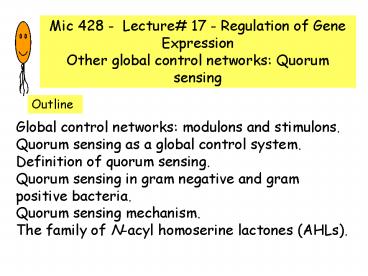Mic 428 Lecture - PowerPoint PPT Presentation
1 / 18
Title:
Mic 428 Lecture
Description:
Mic 428 - Lecture# 17 - Regulation of Gene Expression. Other global control networks: Quorum ... Nature Reviews/ Microbiology. 581-592. Autoinducer detection ... – PowerPoint PPT presentation
Number of Views:41
Avg rating:3.0/5.0
Title: Mic 428 Lecture
1
Mic 428 - Lecture 17 - Regulation of Gene
Expression Other global control networks Quorum
sensing
Outline
Global control networks modulons and
stimulons. Quorum sensing as a global control
system. Definition of quorum sensing. Quorum
sensing in gram negative and gram positive
bacteria. Quorum sensing mechanism. The family of
N-acyl homoserine lactones (AHLs).
2
Outline continuation
Quorum sensing in Vibrio fischeri. Lux IR
systems. The lux operon. Detection of
quorum-sensing compounds. Biosensors. Chromobacter
ium violaceum as a biosensor. Autoinducer
production.
3
Organisms have global control systems that
regulate many genes simultaneously in response to
a specific environmental change.
Global control systems often include more than
one regulon.
Modulons and stimulons.
4
Global control systems allow an organism to
respond effectively to signals in its environment.
Signal
Presence of other organisms in the environment.
5
Quorum sensing (or autoinduction)
Environmental sensing system that allows bacteria
to monitor their own population density.
It relies upon the interaction of a small
diffusible signal molecule (the autoinducer) with
a transcriptional activator protein to couple
gene expression with cell population density.
6
Quorum sensing (or autoinduction)
In Gram negative bacteria, most but not all of
these compounds belong to the family of
N-acylhomoserine lactones (AHLs).
In Gram positive bacteria ? - butyrolactones
and post - translationally modified peptides.
7
Quorum sensing mechanism
Regulatory protein
Autoinducer reaches threshold
1. Bioluminescence 2. Virulence factors 3.
Biofilm formation 4. Nodulation 5. Antibiotic
production 6. Bacterial swarming
DNA
Single bacterium enlarged
Diffusible autoinducer
Bacterial population
Brelles-Mariño, 2001
8
N-Acyl homoserine lactones
- They differ in the length of their N-linked side
chains, the nature of the substitution at the
3-carbon position and the presence or absence of
one or more non-saturated bonds within the side
chain.
9
The first bacterial species in which quorum
sensing systems were discovered were Vibrio
fischeri and Vibrio harveyi. The quorum sensing
systems in these two organisms remain paradigms
for quorum sensing in all other species.
10
The V. fischeri LuxR/LuxI system was the first
bacterial cell to cell communication system to be
characterized and soon became a paradigm. In gram
negative bacteria, two important proteins are
involved in the regulation of QS an R protein,
which is a transcriptional regulator that is
homologous to LuxR of V. fischeri, and an I
protein, which is homologous to the autoinducer
synthase LuxI of V. fischeri and is the enzyme
that synthesizes the signalling molecule, which
is usually an AHL.
11
(No Transcript)
12
From Lasdunzki et al. (2004). Nature Reviews/
Microbiology. 581-592.
13
(No Transcript)
14
Autoinducer detection
These methods involve the use of bacteria that
cannot synthesize AHLs and harboring a reporter
gene, or mutants that cannot synthesize AHLs,
thus requiring the expression of the reporter
gene or the complementation of the mutant
phenotype by the addition of the exogenous AHL.
15
Autoinducer detection
- lux-based reporter assays in an E. coli genetic
background.
- lacZ reporter fusions in an E.coli
orAgrobacterium tumefaciens background.
- Bioreporter based on AHL-induced bacterial
swarming in Serratia liquefaciens.
- Bioreporter based on a gfp-fusion.
16
Use of Chromobacterium violaceum CV026 as
biosensor
Violacein negative mini-Tn5 mutant in which
pigment production can be restored by incubation
with exogenous AHLs.
Direct assay Based on the complementation of the
mutant phenotype. Positive result purple halo on
a white background. Detects AHLs with side chains
shorter than C8.
Reverse assay Antagonistic effect of an
exogenous AHL and the natural inducer. Positive
result white halo on a purple background.
Detects AHLs with side chains longer than C8.
17
Use of Chromobacterium violaceum CV026 as
biosensor
Petri dish reverse assay
As a biorevealing agent in a TLC
18
Autoinducer production
- Dependent on environmental growth parameters.
- Careful choice of culture medium, growth
conditions and detection method. - Dependent on the physiological state of
microorganisms.































